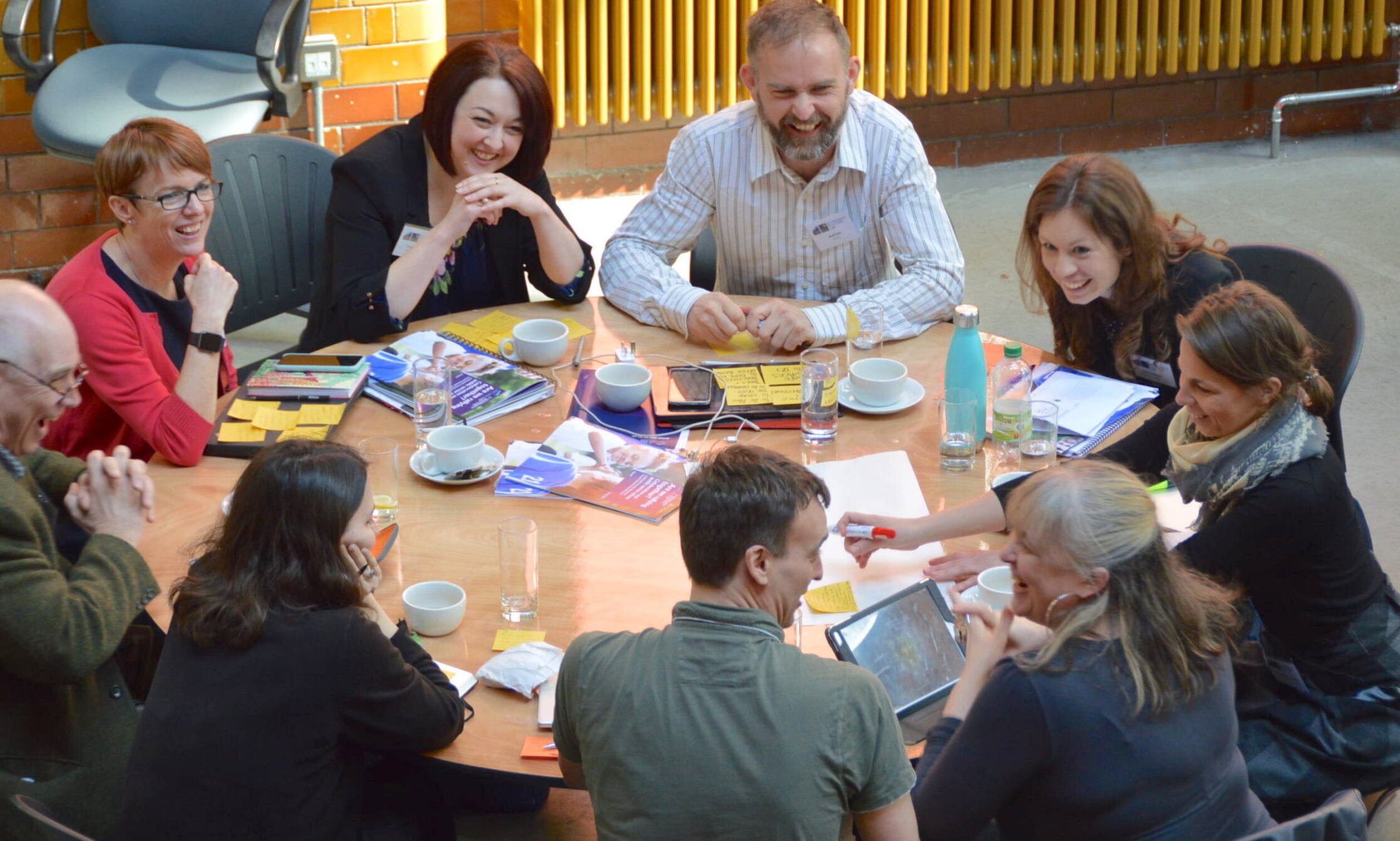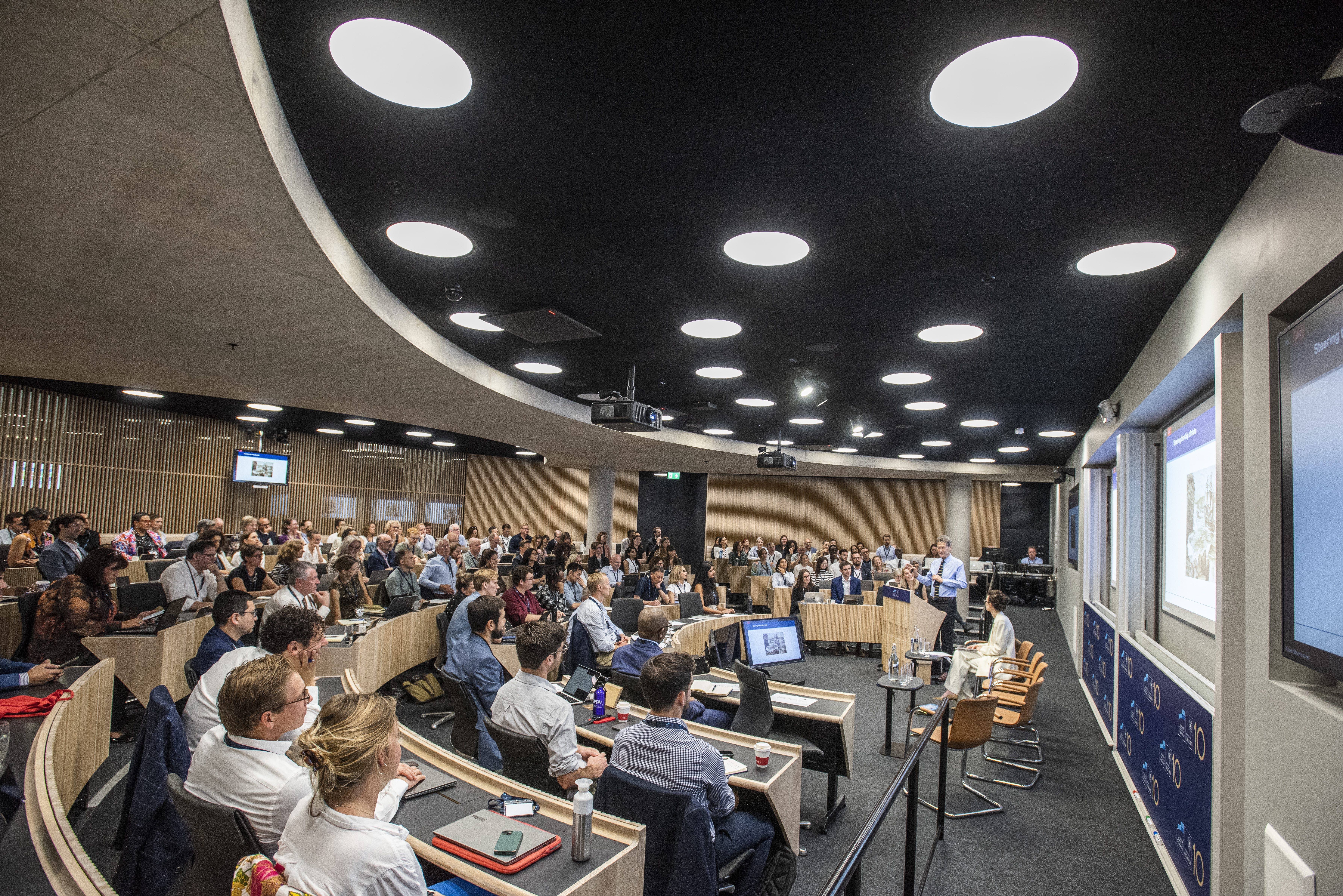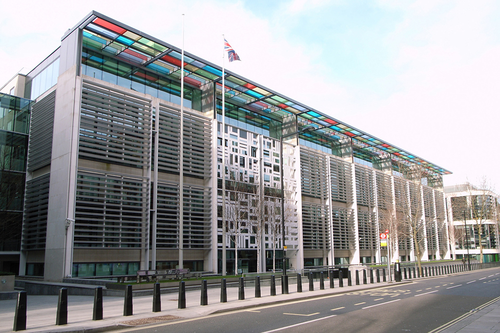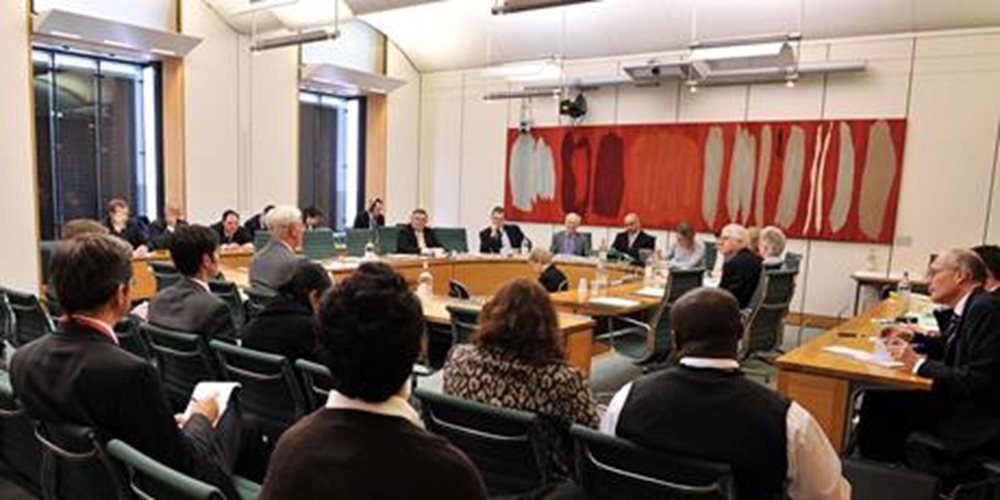Our impact
The GO Lab's role is to investigate how governments partner with the private and social sectors to improve social outcomes. Our research contributes to reports, policies, and evaluations for a variety of global stakeholders.
Building global networks
The GO Lab manages several networks that connect practitioners from around the world. These global networks create the space for them to exchange learnings, forge new collaborations, and improve practice.
International Network for Data on Impact and Government Outcomes (INDIGO)
INDIGO is a data and learning collaborative where different organisations share their data on voluntary basis with the aim of creating a series of open data assets and advancing our understanding of outcomes-based contracting. The INDIGO initiative includes community activities, a system for sharing data, and various tools and datasets available as open data on the GO Lab website. As an emerging data collaborative, we believe that helping more people share and use quality data will improve both the efficiency and effectiveness of these projects.
The INDIGO peer learning group is about building shared culture and standards around data in social outcome-based projects. The group meets quarterly and is a forum for civic tech enthusiasts, policy-makers and other actors in cross-sector partnerships for social outcomes to work together towards better data for better social outcomes. The sessions are run by Mara Airoldi, GO Lab Academic Director, Juliana Outes Velarde, GO Lab Senior Data Steward and Srinithya Nagarajan, GO Lab Policy Engagement and Communications Associate.
Learn more here: INDIGO Peer Learning Group
The International Network for Data on Impact and Government Outcomes (INDIGO) is a community of peers with an interest in sharing data about the design, implementation and evaluation of outcome-based projects. INDIGO's objective is to support the use of quality data by policymakers who are addressing complex social problems. To complement our INDIGO peer learning group, we hold a bi-annual hackathon-style, "Hack and Learn" event.
Learn more here: INDIGO Hack and Learn
The GO Lab also currently in partnerships with data stewards around the world. These partnerships consolidate data and knowledge-sharing infrastructure on outcomes-based contracts with particular focus on specific geographic regions. Currently, the GO Lab engages with data stewards in Brazil and South Africa.
Learn more about our work in Brazil: Brazil Global Data Stewards
Learn more about our work in South Africa: South Africa Global Data Stewards
Oxford Procurement of Government Outcomes Club (Oxford POGO Club)
The Oxford Procurement of Government Outcomes Club (Oxford POGO Club) is a knowledge sharing initiative that is open to anyone interested in capacity building in public procurement and in collaboration to improve social outcomes. We host monthly calls, maintain a maillist, and share other resources. Participants come from many different disciplines, sectors, and countries. The Oxford POGO Club is chaired by Anne Davies, Professor of Law and Public Policy and managed by Ruairi Macdonald, GO Lab Research Associate.
Learn more about the POGO Club: Oxford POGO Club

Sharing the latest evidence
The GO Lab consolidates and produces research on the evidence and best practice around the use of outcomes-based partnerships. Beyond generating evidence, the GO Lab focuses on ensuring that the information is understandable, usable, and actionable for policymakers.
Global Knowledge Hub
The GO Lab hosts a Global Knowledge Hub on outcomes-based partnerships. This consists of reports, case studies, and other multi-media resources from both internal and external sources. The Global Knowledge Hub serves as a one-stop shop for anyone looking to learn more about outcomes-based partnerships and related fields.
Learn more here: Global Knowledge Hub
Engaging with Evidence
Engaging with Evidence is a series of interactive online convenings hosted by the GO Lab and designed to encourage a greater understanding of the latest evidence on the use of cross-sector partnerships focused on outcomes. Launched in 2021, this webinar series offers an open platform for policymakers, practitioners and researchers around the world to engage with key findings from the latest research and evaluation work in the field.
Learn more here: Engaging with Evidence

Supporting policymaking
The GO Lab routinely engages with and advise stakeholders from all over the world. Our comprehensive programmes of engagement & capacity building ensure that the GO Lab's work directly supports policymaking.
Life Chances Fund Evaluation
We are the UK Government’s evaluation partner for the Life Chances Fund (LCF). Through our engaged research, we are conducting multiple, longitudinal evaluations across the portfolio of 29 projects offered funding by the LCF.
Learn more: Life Chances Fund Evaluation
Mental Health and Employment Partnership evaluation for the Life Chances Fund: First interim report
23 March 2023
Authors: E. Hulse, M. Shiva, , T. Hameed & E. Carter
This is the first of three planned reports within a longitudinal evaluation of the Mental Health and Employment Partnership (MHEP).
MHEP is part-funded by the Department for Culture, Media and Sport (DCMS) under the Life Chances Fund (LCF). The LCF was launched in 2016 as a locally-led SIB fund to tackle entrenched social issues across England. The LCF contributes to SIB projects through payments by results contracts. These contracts involve social investors and are locally commissioned.
DCMS is working in partnership with the Government Outcomes Lab (GO Lab) to evaluate the LCF and the use of SIBs in local commissioning. MHEP was selected for specific longitudinal study because of the existence of comparable projects using traditional commissioning routes. Its findings are based on qualitative interview data and aggregate performance data across the five SIBs
The first interim report of the MHEP evaluation provides information on the project’s theory of change including facilitators, barriers and mediating mechanisms, as well as presenting early quantitative analysis on outcome performance.
View the resource here: Mental Health and Employment Partnership evaluation for the Life Chances Fund: First interim report
Kirklees Integrated Support Service and Better Outcomes Partnership: The first report from a longitudinal evaluation of a Life Chances Fund impact bond
01 December 2020
Authors: Rosenbach, F. and Carter, E.
This is the first Government Outcomes Lab report from our supplementary evaluation of the UK Government’s Life Chances Fund (LCF) which focuses on The Kirklees Integrated Support Service (KISS) Social Impact Bond (SIB). The KISS SIB seeks to improve a range of social outcomes for vulnerable adults who are understood to need support to live independently. The outcomes contract is held by a special purpose vehicle (Kirklees Better Outcomes Partnership, KBOP), which in turn manages individual service delivery contracts with independent provider organisations.
This SIB is a particularly promising evaluation site, as it was preceded by similar provision of ‘Floating Support’ under bilateral fee-for-service arrangements between the Council and the same providers. Analysis of this changed contractual arrangement may help to disentangle the effect of the SIB model from that of the intervention. A range of primary data collection methods were used, including in-depth interviews, documentary analysis and qualitative analysis.
The report identifies four broad challenges faced under the pre-existing fee-for-service arrangements and commissioning environment prior to the adoption of the SIB model in September 2019. These challenges provide hypotheses for future waves of research, which will explore the adoption of the new SIB model.
View the resource here: Kirklees Integrated Support Service and Better Outcomes Partnership: The first report from a longitudinal evaluation of a Life Chances Fund impact bond
Life Chances Fund Second Stage Evaluation Report: Kirklees
31 August 2023
Authors: Franziska Rosenbach, Felix van Lier, Fernando Domingo, Eleanor Carter
This is the second of three planned reports within a longitudinal evaluation of the Kirklees Better Outcomes Partnership (KBOP). KBOP seeks to improve accommodation, employment, stability and wellbeing outcomes for vulnerable adults who are in need of support to live independently.
KBOP is part-funded by the Department for Culture, Media and Sport (DCMS) under the Life Chances Fund (LCF). The LCF was launched in 2016 to tackle entrenched social issues across England through locally-led social impact bonds (SIBs) - also known as social outcomes partnerships. The LCF contributes to SIB projects through payments-by-results contracts. These contracts involve social investors and are locally commissioned.
DCMS is working in partnership with the Government Outcomes Lab (GO Lab) to evaluate the LCF and the use of SIBs in local commissioning. KBOP was selected for specific longitudinal study because it was preceded by a similar service provided under bilateral fee-for-service arrangements between the Council and the same providers. Analysis of this changed contractual arrangement may help to isolate the effect of the SIB model on service delivery. The analysis is based on a range of primary data collection methods involving 38 in-depth interviews and documentary analysis, including contract terms of the fee-for-service contract and the SIB
This second interim report examines four hypotheses developed in the first interim evaluation of the KBOP SIB. These suggested that the SIB mechanism might lead to enhanced:
- practice of market stewardship
- performance management
- collaboration
- flexibility and personalisation of the service
The report also reviews KBOPs contractual framework and governance processes, and concludes with a series of key learnings from the process evaluation.
View the resource here: Life Chances Fund Second Stage Evaluation Report: Kirklees
GO Lab's Felix-Anselm van Lier secondment to DLUHC

Felix-Anselm van Lier, one of the GO Lab's postdoctoral research and policy fellows, undertook a six-month secondment at the Department for Levelling Up, Housing, and Communities. During this period, he collaborated with and gained valuable insights from the team working on the Changing Futures Programme. Changing Futures is a four-year initiative with a budget of £77 million, funded by the government’s Shared Outcomes Fund and supplemented by aligned funding from the National Lottery Community Fund. Its primary objective is to enhance outcomes for adults grappling with multiple disadvantages.
In his role at Changing Futures, Felix led the relationship management with various local areas. This experience afforded him a profound understanding of the innovative strategies local areas employ to tackle the issues of fragmented service provision. Additionally, he took the lead in formulating a draft outcomes framework for a potential successor to Changing Futures. This framework aims to establish a coherent national perspective on multiple disadvantages. It also serves as a foundation for inter-departmental policymaking, for instance, by aligning outcomes across related programmes.
Changing Futures stands as a remarkable testament to a central government's programme’s efforts to address the enduring challenges of fostering effective collaboration between central and local government entities. It also seeks to dismantle the siloed structures within central government that frequently impede integrated and comprehensive service delivery. (For a detailed analysis of previous government endeavours to unify local service delivery, refer to Gibson, M., van Lier, F-A., Carter, E. (2023) 'Tracing 25 years of “initiativitis” in central government attempts to join up local public services in England', Policy & Politics, 1-23).
The secondment further underscored the ongoing challenges faced by central government in effectively leveraging the vast qualitative data received from local authorities. Against this background, the GO Lab is in the preliminary stages of launching a project in collaboration with DLUHC, aiming to utilize cutting-edge machine learning tools to bolster evidence-driven policymaking in the field of rough sleeping and homelessness.
Plan for Jobs and employment support: Government Outcomes Lab response to the call for evidence
In September 2022, the UK Parliament's Work and Pensions Select Committee held a call for evidence as part of their inquiry into the effectiveness of Government support to get people into employment, including disadvantaged groups such as those in low-paid jobs and young people. In collaboration with Professor Adam Whitworth (University of Strathclyde), and drawing on both GO Lab and wider research into employment support, the GO Lab submitted a response, focusing on how the government can best support those who face the greatest barriers to labour market inclusion.
Learn more here: Plan for Jobs and employment support: Government Outcomes Lab response to the call for evidence
Efficiency and resilience: How can we adjust the dial?
In January 2023, we (Nigel Ball and Loic Menzies) convened a roundtable at the Blavatnik School of Government, University of Oxford, to explore how a better balance can be struck between efficiency and resilience. By summarising the discussions from the roundtable, and setting out a number of ideas that emerged from it, the GO Lab report contributes to the discussion regarding how policy can shift towards prevention and resilience.
Learn more here: Efficiency and resilience: How can we adjust the dial?

Latest Media
Catch the latest external media featuring work from the Government Outcomes Lab.
Life Chances Fund Evaluation - second report on Kirklees Better Outcomes Partnership
31 August 2023
The GO Lab's report on the Kirklees Better Outcomes Partnership (KBOP) social impact bond (SIB) has now been published. This study is part of a series of evaluations on SIBs, investigating the impact of commissioning services through a SIB instead of other commissioning approaches. The KBOP SIB receives additional funding from the Department for Culture, Media & Sport’s (DCMS) Life Chance Fund (LCF).
Read the report here:
Life Chances Fund Evaluation - second report on Kirklees Better Outcomes Partnership on GOV.UK
Life Chances Fund Evaluation - second report on Kirklees Better Outcomes Partnership on GO Lab's Knowledge Hub
Book Launch: Social Economy Science
14 September 2023
"Social Economy Science" (Oxford University Press) was edited by Gorgi Krlev, Dominika Wruk, Giulio Pasi, and Marika Bernhard, the book brings together cutting-edge research on a suite of important questions such as: How can social entrepreneurship and social innovation play an essential role in addressing persistent societal problems, including the challenge of creating more democratic, equitable and participatory forms of organising? How can impact investing and social outcomes contracting by governments change the ways in which we think about funding the common good? The book includes contributions from leading scholars and practitioners in the field, including Geoff Mulgan, Julie Battilana, Mario Calderini, and GO Lab’s own Eleanor Carter.
Check out the book here: Social Economy Science
The Government Outcomes Lab: Researching new models of collaboration for better social outcomes
13 September 2023
Governments worldwide face major challenges such as homelessness, education access, and healthcare support and there is wide recognition that governments can’t tackle these issues alone. Governments need to work effectively with non-profits, with social enterprises, business, and philanthropies to achieve better social outcomes. In recent years, outcomes-based partnerships (cross-sector partnerships whereby funding is contingent on the achievement of measurable outcomes) have emerged as a promising way to enable more effective and more impactful public-private collaboration. However, do these approaches live up to their promise? And how can we ensure that these partnerships are designed and managed as effectively as possible, building on existing evidence, data and best practice?
Our hosts, Nikki Lucenario and Gloria Wawira, are joined by Andreea Anastasiu, the Executive Director of the Government Outcomes Lab (GO Lab) at the Blavatnik School of Government, University of Oxford to discuss how outcomes-based partnerships are becoming a useful tool for governments around the world.
Founded in 2016 by the Blavatnik School and the UK to deepen the evidence around the use of innovative outcomes-based partnerships. Their work promotes an inclusive and responsive approach to generating evidence and seeks to bridge the gap between research and practice by curating opportunities for knowledge exchange for scholars, policymakers and practitioners around the world.
This episode is produced by Paul Austin.
Listen to the episode here: The Government Outcomes Lab: Researching new models of collaboration for better social outcomes